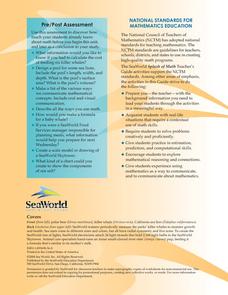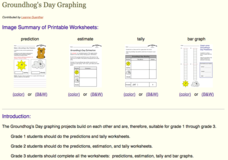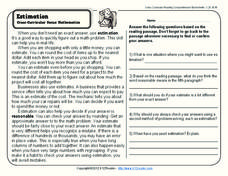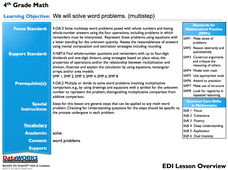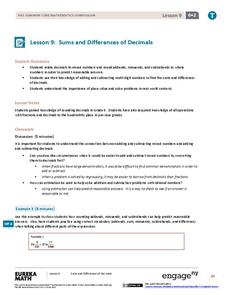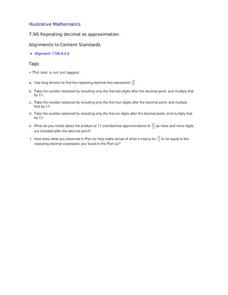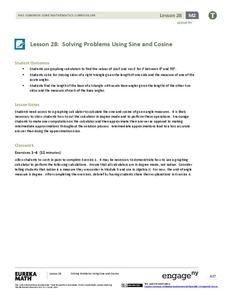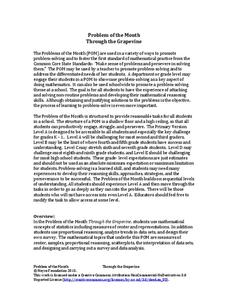For the Teachers
$1 Math
Captivate your class by having them find the value of their names, different zoo animals, musical instruments, etc.,with a mental math lesson. Using the coding formula listed, children learn to fluently estimate and calculate...
Sea World
Splash of Math
How can kids use math to learn about marine life? Combine math skills with science lessons in a resource featuring activities about life in the sea. Kids graph and calculate data, solve complex word problems, measure geometric shapes,...
Baylor College
Food: The Math Link
Enrich your study of food science with with these math worksheets. They offer a variety of food-related word problems that are great practice for multiplying, identifying fractions, estimating length, and performing calculations...
Virginia Department of Education
Modeling Division of Fractions
Provide a meaningful context for learning about the division of fractions with this upper-elementary math lesson plan. Presented with a simple, real-world problem, young mathematicians work in small groups to develop visual...
Virginia Department of Education
Integers: Addition and Subtraction
Young mathematicians construct their own understanding of integers with an inquiry-based math lesson. Using colored chips to represent positive and negative numbers, children model a series of addition and subtraction problems as...
Kid Zone
Groundhog's Day Graphing
This Groundhog's Day, challenge scholars to predict, estimate, tally, and graph in a weather-themed lesson in which class members play the role of the groundhog to forecast the weather come February second.
Curated OER
My Foot and the Standard Foot
Young mathematicians put one foot in front of the other as they learn how to measure length in an elementary math lesson. Using paper cutouts of their own feet, children measure classroom objects as they discover the importance of...
National Security Agency
Time After Time
Save those precious minutes and hours spent planning math lessons with this mini-unit on telling time. Offering a series of engaging hands-on and collaborative learning activities, these three lessons teach children how to read...
K12 Reader
Estimation
When is it a good idea to use estimation? Learn about estimation and rounding with a reading comprehension lesson. After kids read a passage about estimation, they answer five comprehension questions on the other side of the page.
EngageNY
Grade 5 Math Module 1, Topic E, Lesson 12
Continuing from the previous instructional activity, scholars work on mastering the skill of multiplying decimal fractions by a whole number. The method employed in the instructional activity is to convert the decimal fraction to its...
Math Learning Center
Grade 5 Supplement Set A3 – Number and Operations: Estimating to Multiply and Divide
Teach young mathematicians that sometimes just getting close to the exact answer is perfectly fine, by using this collection of estimation worksheets.
DataWorks
4th Grade Math: Multi-Step Word Problems
Solving word problems requires reading comprehension and math computation. Through an interactive slideshow presentation, fourth graders observe and follow each step toward solve multiplication and division word problems.
Virginia Department of Education
Practical Problems Involving Decimals
After discussing decimals and "going shopping" in the classroom, young mathematicians are given four practical word problems that require them to estimate their answers, given specific information. The highlight of the lesson is...
EngageNY
Sums and Differences of Decimals
Sometimes dealing with decimals is so much easier than dealing with fractions. The ninth lesson in a 21-part module has the class consider situations when it might be easier to add or subtract fractions by first converting to...
EngageNY
The Pythagorean Theorem
Class members explore the estimation of irrational numbers in association with the Pythagorean Theorem. The first lesson of this module challenges pupils to use the Pythagorean Theorem to find unknown side lengths. When the length is not...
Curated OER
Repeating Decimal as Approximation
You are used to teaching repeating decimals with bar notation that keeps us from writing that number over and over again; now teach what the over and over again represents. This activity allows your mathematicians to explore the infinite...
Partnership for Educating Colorado Students
Mayan Mathematics and Architecture
Take young scholars on a trip through history with this unit on the mathematics and architecture of the Mayan civilization. Starting with a introduction to their base twenty number system and the symbols they used, this eight-lesson unit...
Arizona Department of Education
Area and Perimeter of Regular and Irregular Polygons
Extend young mathematicians' understanding of area with a geometry lesson on trapezoids. Building on their prior knowledge of rectangles and triangles, students learn how to calculate the area of trapezoids and other...
EngageNY
Estimating Digits in a Quotient
Boiling down any division problem to a one-digit divisor problem sure makes estimation easy. The lesson shows how to estimate division problems by using place value understanding and basic arithmetic facts to simplify the division. Some...
Charleston School District
Comparing and Ordering Irrational Numbers on a Number Line
Estimating the value of numbers is much harder than it sounds! Scholars compare and order the value of numbers presented in different forms including fractions, decimals, roots, integers, and pi. This builds on the previous lessons in...
EngageNY
Solving Problems Using Sine and Cosine
Concepts are only valuable if they are applicable. An informative resource uses concepts developed in lessons 26 and 27 in a 36-part series. Scholars write equations and solve for missing side lengths for given right triangles....
David Pleacher
Candy Math Fun
Few things can motivate children to learn like the promise of a sweet and tasty treat. Given a bag of M&M®s, Skittles®, or other colorful candy, students first predict the contents of the bag before counting the pieces,...
Rational Number Project
Initial Fraction Ideas Lesson 18: Overview
Develop young mathematicians' ability to compare fractions with investigation into the number 1/2. After brainstorming a list of fractions equivalent to 1/2, children identify a pattern in the numerators and...
Noyce Foundation
Through the Grapevine
Teach statistics by analyzing raisins. A thorough activity provides lesson resources for five levels to include all grades. Younger pupils work on counting and estimation, mid-level learners build on their understanding of the measures...

